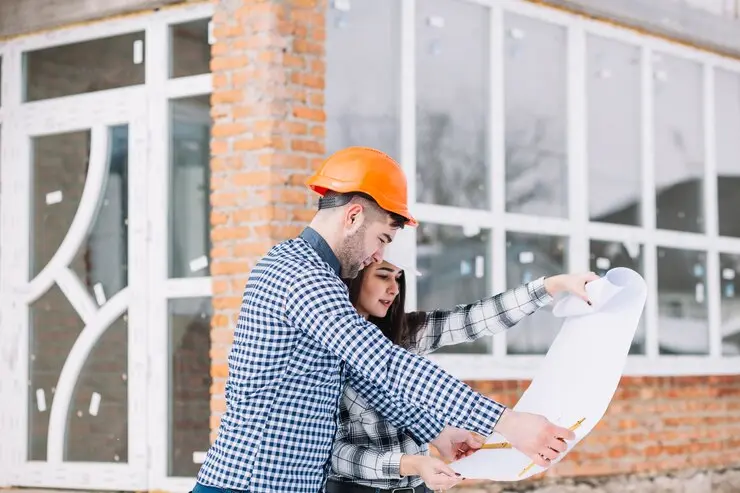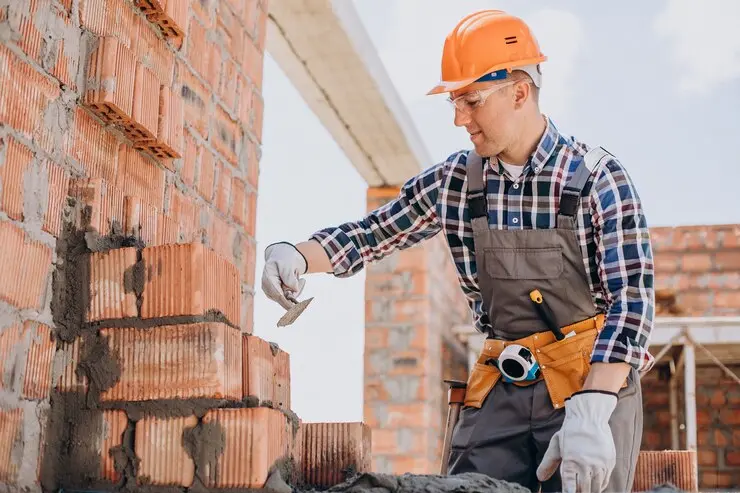How Much Does Masonry Work Cost Per Hour?
Do you know the importance of masonry work? Masonry is essential to the construction and upkeep of structures that endure for many years. Budgeting for your building or home repair projects is made simpler when you know how much masonry work costs per hour.
Estimating the total cost of repairs such as repairing a cracked foundation, rebuilding a chimney, or erecting a new brick wall is made easier when you are aware of the hourly rate.
You can take better care of your house or building and keep it sturdy and attractive for many years by learning about masonry costs. Let’s explore with us.
What Is Masonry?
Masonry is the process of constructing structures out of separate pieces that are joined together with mortar. The most popular materials for masonry construction are brick, stone, and concrete blocks.
Masonry is a widely used construction method because of its many benefits. There are restrictions, though, just like with any construction technique. The benefits and drawbacks of masonry construction are compiled in this article.
Common Masonry Projects and Their Prices
Let’s examine three typical masonry jobs and their approximate costs.
-
Tuckpointing and Repointing
Brick-to-brick mortar deterioration over time may result in gaps or cracks. To maintain the strength and aesthetics of the structure, repointing and tuckpointing involve removing the old, damaged mortar and replacing it with new mortar.
But, how much does it cost to tuckpoint 30 bricks? It depends on the extent of the damage and whether the bricks themselves require repair, these fixes can cost anywhere from $3 to $25 per square foot. Larger or more complex brickwork will cost more, even though smaller sections might be less expensive.
-
Repairs for Foundations
Because foundations are essential to a building’s stability, repairs are typically more costly. Depending on the severity and materials used, fixing a small crack can cost anywhere from $250 to $800 per crack. However, it can cost between $20,000 and $30,000 to replace a severely damaged foundation.
-
Repairs for Brick Porches or Walls
Although many homes have brick walls and porches, these elements can deteriorate with time. Fixing minor cracks or replacing a few bricks are examples of small fixes that typically cost $10 to $30 per square foot. The size of the repair area and structural components like support beams affect the overall cost.
| Tuckpointing and Repointing | $60 – $90 per hour |
| Repairs for Foundations | $70 – $120 per hour |
| Repairs for Brick Porches or Walls | $65 – $100 per hour |
How To Calculate Masonry Work?
- Brick masonry volume is equal to length (m) times depth (m) times wall thickness.
- Brick Length x Brick Width x Brick Height = Brick Size
- Volume of Brick Masonry/Volume of One Brick = Number of Bricks
- Number of Bricks x Volume of Brick Without Mortar = Actual Volume of Bricks Mortar
- Volume of Brick Masonry – Volume of Bricks Without Mortar = Quantity of Mortar
Where
- The units of measurement for the entire area are cubic meters (m3) and cubic feet (ft3).
- In this case, the ratio is 1:5, which means that 5 parts sand and 1 part cement are present. The total amount of sand and cement is six.
- A brick made entirely of sand and cement has a volume of 0.002, while a brick made with cement and sand has a volume of 0.002.
- One cement bag has a capacity of 0.035.
- 1500 is the volume conversion from m3 to kg.
- Length and width are measured in centimeters or meters.
- Keep in mind that 35.3147 ft3 = 1 m3.
You can learn how to calculate masonry brick work per square foot using this method.
Elements Influencing the Hourly Cost of Masonry Work
Several factors affect the hourly rate for masonry work prices.
-
Rates of Labor
Masons hourly rates range from $40 to $100, depending on their location and level of experience. Because of their experience, highly skilled masons typically charge more, whereas less-experienced workers may charge less but take longer to finish tasks.
-
Complexity and Location
Because of higher demand and living expenses, labor costs are typically higher in urban areas. Simple jobs like brick and mortar repair costs are less expensive than more complex ones that take more time and expertise, like historic restoration or decorative brick patterns.
-
Project Type
The cost of masonry varies according to the project type. Repairing a chimney frequently necessitates working in confined, high areas, which calls for patience and skill. Structural safety depends on foundation repairs, which raise costs because of the accuracy needed. Because they require specialized expertise, stonework projects like decorative patterns are also more expensive.
-
Accessibility
Costs go up when project locations are difficult. Due to the additional time and effort required, jobs involving scaffolding or difficult-to-reach places, such as tall walls or chimneys, can result in labor costs increasing by as much as 40%.
-
Materials and Permits
Permits for large masonry projects can cost anywhere from $100 to $250. Furthermore, depending on the distance, material delivery costs for things like bricks can range from $60 to $200.
Brick wall waterproofing is one of the extra services that costs $2 to $10 per square foot. The price range for mortar color matching tests is $150 to $325. Specialized techniques may be required for complex or historical projects, increasing the cost of labor and materials.
What You Should Know About the Hourly Rate of Skilled Masons vs. Handymen
Knowing the hourly rate for masons is crucial when hiring them for masonry work.
-
Expert Masons
The hourly rate for skilled masons ranges from $50 to $100. They can finish projects faster and with higher quality thanks to their experience. Complex tasks like stone carving or historic building restoration, are typically worth the additional expense because they complete the task correctly the first time.
-
Workers with Less Experience
Although they may take longer and produce work of a different caliber, handymen typically charge between $30 and $50 per hour. They work well for easier, smaller repairs. A professional mason is frequently a better option for complex or long projects.
Advantages of Masonry Construction
All varieties of masonry units (brick, stone, or concrete blocks) have the following general benefits:
- Because masonry is non-combustible, it increases the building’s and its occupants’ protection from fire. For the same reason, masonry is frequently used to construct fireplaces.
- Masonry provides a high level of resistance to weather, pests, rotting, and natural disasters like tornadoes and hurricanes.
- Depending on the material and the skill of the workers, masonry structures can give a house or building an appealing rustic or elegant appearance.
- Mansory can sustain high compressive weight loads because it is resilient and long-lasting.
- A building’s thermal mass is increased by masonry units.
- Compared to other building types, masonry structures have the longest lifespans.
- Your construction will have a higher resale value if you use masonry.
- Insects like termites and ants cannot break down the structure of masonry, nor does it rot.
- When it comes to labor and materials, this method of construction is less expensive than using wood.
How to Reduce the Cost of Masonry
Although masonry projects can be costly, costs can be reduced without compromising quality.
-
Make Maintenance Plans
Repointing, or replacing old mortar, regularly can help avoid more serious and costly problems like structural damage. By addressing minor issues early on, major fixes can be avoided later.
-
Employ Locally
Transportation and material delivery costs are reduced when local mason contractors near me are hired. The project will go more smoothly because local masons are also aware of the needs unique to the area.
-
Simplify Design
More work and materials are needed for intricate stonework or intricate brick patterns. To cut costs, choose simpler designs.
How Masonry Project Budgeting Works
It’s critical to evaluate the overall costs when creating a budget for masonry work.
-
Calculate the Total Costs
Let’s start with the hourly wage. Add the price of materials like bricks and mortar after that. The length of the project affects the overall cost as well because longer projects require more labor.
-
Get Quotes
Get quotes from multiple local contractors at all times. Comparing several quotes helps guarantee you receive the best deal because rates differ depending on location and experience.
Conclusion
Masonry pay rate can range according to the kind of service, size of the project, and degree of skill needed. Accurate estimates are essential for efficiently managing project budgets, whether the work involves tuckpointing, foundation repairs, or repairing brick walls and porches. Employing skilled masons lowers the possibility of future repairs or structural problems while guaranteeing high-quality results.
Asking for detailed estimates from several contractors will help you get the best deal. By comparing services, one can guarantee transparency and steer clear of unforeseen expenses. Furthermore, emphasizing fine craftsmanship improves a structure’s durability, security, and visual appeal. Homeowners can stay within their budget and make sure the work meets their expectations with careful planning and a clear understanding of the project requirements, which eventually gives them peace of mind.
Read More: Cost estimators
FAQs
Which indicators point to the need for masonry repair?
Brick or mortar joint cracks suggest that the structure might be deteriorating. Another indication is spalling, or surface flaking of the brick. Brick fragments break off as a result of water seeping into them and freezing.
What is the cost of labor for masonry?
Masons’ hourly rates range from $40 to $100, depending on their location and level of experience. Because of their experience, highly skilled masons typically charge more, whereas less-experienced workers may charge less but take longer to finish tasks.
What is the brickwork costing methodology?
Typically, brickwork expenses are computed either by the square foot or per brick. Depending on the brick type and complexity of the job, prices range from $10 to $30 for most projects that use the per-square-foot method. Masons might charge $1 to $5 per brick, including labor, for minor problems.
Which masonry unit types are most common?
Although clay and concrete masonry units are the most widely used, other varieties are available for specific applications. These consist of calcium silicate and cast stones.





